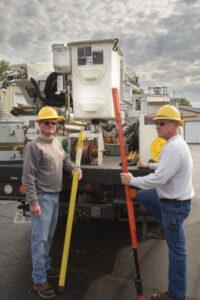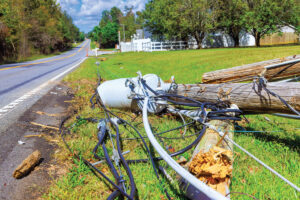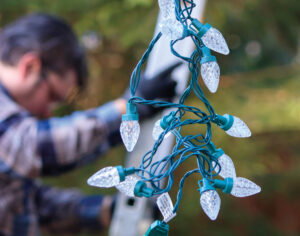 Mother Nature can be a dangerous foe and flatten an entire neighborhood in a matter of minutes. While we can hope for the best when it comes to the weather, Illinois’ electric co-op linemen are ready. Are you prepared for the worst?
Mother Nature can be a dangerous foe and flatten an entire neighborhood in a matter of minutes. While we can hope for the best when it comes to the weather, Illinois’ electric co-op linemen are ready. Are you prepared for the worst?
September is National Preparedness Month and Safe Electricity and the electric co-ops of Illinois want you to be prepared for disasters and the potential electrical dangers related to severe weather. Created in 2004 and sponsored by the Federal Emergency Management Agency (FEMA), National Preparedness Month is set aside to encourage Americans to take steps to prepare for emergencies.
“Severe weather can strike year round,” explains John Lowrey, Safe Electricity Advisory Board member. “Anymore, it is not a matter of if, but when severe weather will strike.”
You need to create a storm preparedness kit with enough supplies to last at least three days in case of a power outage. This kit includes: water, food, blankets, pillows, clothes, a first aid kit, medicines, toiletries, flashlights, batteries and a radio. A detailed list can be found on SafeElectricity.org.
Learn about the local warning systems in regard to a variety of emergencies. This could include emergency radio or television broadcasts, sirens or cell phone messaging.
Here are tips, should severe weather occur:
• Do not step into a flooded basement, if electrical equipment could be in contact with the water. Submerged outlets can energize water and could cause electrocution.
• Never attempt to turn off power at the breaker box or touch an electrical appliance if you are wet or in standing water. Call your electric utility to shut off power at the meter.
• If an electrical appliance has been in contact with water, have a professional check it out before it is used. It may need replaced.
• If the smell of gas is apparent, or if there is a suspected leak in your house, leave immediately and call your gas utility.
• If power lines are on the ground, stay far away from them and warn others to stay away. Contact the local electric utility because the lines could still be live.
• Downed power lines can also energize tree limbs or debris, so be alert during clean-up.
• Any power line that is dead could become energized at any moment due to power restoration or backup generators.
• If driving, never get out of the car if there is a downed power line, and never drive over one.
• Always use caution following severe weather. You do not know how landmarks have been impacted, if stop signs have been removed, or if power has been cut to stoplights or railroad crossings.
• Before entering storm-damaged buildings, make sure electricity and gas are turned off.
• Do not use electrical equipment during cleanup after a storm if the ground is wet.
• If the power is out, unplug electronics. The power may come back in spikes, and the power surge can destroy electronics.
• Conserve electricity. Even though you still have power, your utility may be struggling to provide electricity to all its customers. Use only the electricity you need.
• Throughout the year, keep the electrical system in your home in good working order. This will help keep your system stable in normal conditions and prevent accidents in extreme ones. A qualified electrician can inspect your home’s electrical system and make recommendations.

“Unfortunately, unplanned events-especially weather-can damage our electrical system. Downed power poles and lines, as well as other damaged equipment, could all be fatally dangerous,” says Lowrey. “Knowing how to avoid electrical risks is an important part of preparedness.”
For more severe storm preparedness and electrical safety information, visit SafeElectricity.org.








